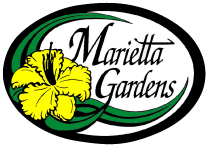|
Daylilies are fibrous-rooted, hardy perennials. They consist of three major growing parts – roots, crown and foliage. There are three types of foliage- Dormant, Evergreen and Semi-Evergreen.
Where To Plant. Most daylilies bloom best in full sun. They require a minimum of six hours of sun. If planted near or under trees, daylilies must compete with tree roots and do better if given extra water.
Type of Soil. Any good garden soil is appropriate for growing daylilies. Daylilies will grow in sandy soil or in heavy clay. The ideal soil holds sufficient moisture but should also be well drained. It is important to prepare your soil by adding peat moss, humus, and compost. In clay soil you will also use sand plus the three other ingratiates.
When to Plant. Daylilies can be planted anytime from Spring through Fall.
In the North, Spring planting is preferred. In warmer climates, early spring or late fall will work best. Your climate and hardiness of plants should be considered in planting.
How to Plant. Your soil and surrounding will determine where you plant your daylilies. The soil should be worked into a good loose condition to a depth of at least a foot prior to planting. New plants should be planted about as deep as they were growing originally. The original depth is easily determined by the white band at the base of the foliage. You should not plant your daylilies any deeper than that white band. The crown should be planted no more than one inch below the surface. It is important to make sure there
are no air pockets left around your plants. This can be accomplished by watering well when finished planting.
Dividing Daylilies. Daylilies can be divided every three to four years. Dig the
entire plant up and pull the fans apart. In large clumps, use a butcher knife, screwdriver or sharp spade to separated the clump. Make sure you divide your daylilies into at least three fans or more.
Spacing. Daylilies should be spaced between 18” and 24” apart on each side. Some varieties multiply very fast and your clump will become crowed if planted too close to each other. The blooming effect is also lessened if the daylilies are too close together. Some varieties may increase slowly. Daylily growth habits vary with the variety and you will have different height of blooms. You will have to arrange your daylily so they are easily viewed. The shorter ones should create your border and the taller ones should be arranged giving depth to your garden. Companion plants should be used with daylilies, thus giving you a different effect throughout the season.
Care and Culture of Daylilies.
Watering . Water is essential for good performance. Although daylilies can survive in a drier soil, water will increase your success and show your plants full potential. The more attention that the daylilies receive with watering, the greater the reward you will receive during bloom season. Water and fertilizing go hand and hand to receive more abundant bloom, larger blooms, and more rebloom is directly dependent on watering and fertilizing.
Fertilizing. Daylilies do best in slightly acid soil, PH should be between 6 and 7. Fertilizer such as 16 - 4 - 8 a slow release fertilizer, or cow manure should be used in the spring, early summer and again in early fall. We do use ammonia nitrate around February 10th here in North Carolina which we are in zone 7. Ammonia Nitrate is used because we do not want to get our middle number too high. Getting too much of the middle number can lock up your fertilizer and will cause your fertilized to lock up. Epsom salt is used to solve this problem and it is still good to use it ever year it will make your foliage lush green. You should put a little cow manure in the soil when you set out your new plants out.
Mulching. Mulching generally does contribute to better daylilies by improving the soil and helping retain moisture.
Rot. Can be stopped by using K Phite 1 oz per gal of Water. Make sure you get the plant cleaned of rot. We usulay put 1 oz in a gallon milk with water and put a little mound around the plant and pour some around the plant If you have questions or concerns about growing and care of daylilies, or if you now of any other concers that we can add. Please email mail@mariettagardens.com
Or call. 910-827-9791 We will try to answer your questions. |
